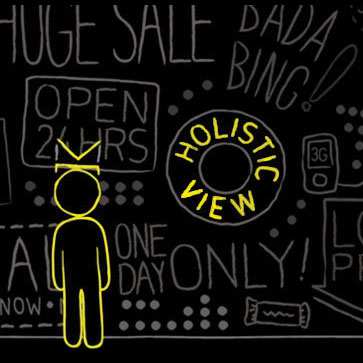Is Ad Blocking Really That Bad?

by Pete Prestipino
16 Jan, 2023
Digital advertising and 'Net publishers are concerned about ad blocking and its numerous implications, but should they be?
eMarketer just announced a revision on its estimates of ad blocking users in the U.S., reducing the number to 75.1 million. At that level, more than one-quarter (27.5 percent) of U.S. Internet users will use ad blockers this year. eMarketer previously forecast that the ad blocking audience would top 86 million in 2017. While the estimate has been reduced, growth still appears significant, at 16.2 percent. So is ad blocking still reason for concern? In many ways, yes it is, at least among certain demographics.
Ad blocking continues to be far more prevalent, for example, among younger people. This year, according to eMarketer, 41.1 percent of millennials will use ad blockers, eMarketer estimates. That is considerably lower among Gen X Internet users, at 26.9 percent. Among baby boomers, ad blocking is still rather uncommon at just 13.9 percent of users.
Ad blocking is also more common among desktop/laptop users than smartphone users (likely because of a lack of effective technology particularly within apps). For smartphones, eMarketer estimated, the incidence of ad blocking remains relatively low, at less than 8 percent.
What's more, publishers' efforts to limit content to those with ad blockers enabled seems to be working. While some publishers have made a conscious effort to switch to less intrusive ad formats, others are shifting their revenue models as a result.
Make no mistake, while ad blocking may not be as widespread as many anticipated, it's still a serious issue and it only stands to increase in severity with time.
Mozilla-backed Cliqz, for example, a German startup building an anti-tracking browser with a built-in private search feature powered by aggregated usage of its products, is reportedly in the process of acquiring the consumer assets of ad-tracker privacy tool and browser extension Ghostery.
"By combining algorithmic and blocklist anti-tracking approaches, Cliqz and Ghostery will together further raise the benchmark in privacy protection," Cliqz published in a press release announcing the development.
Cliqz is acquiring Ghostery's anti-tracking browser extensions and mobile apps, meaning it will be gaining the latter's 10 million active users - hoping that will help spur international growth.
As an Internet user, do you use an ad blocker? As an advertiser or publisher, what steps have you taken to minimize the problem considering the technology industry's continued attention on the ad blocking threat?
eMarketer just announced a revision on its estimates of ad blocking users in the U.S., reducing the number to 75.1 million. At that level, more than one-quarter (27.5 percent) of U.S. Internet users will use ad blockers this year. eMarketer previously forecast that the ad blocking audience would top 86 million in 2017. While the estimate has been reduced, growth still appears significant, at 16.2 percent. So is ad blocking still reason for concern? In many ways, yes it is, at least among certain demographics.
Ad blocking continues to be far more prevalent, for example, among younger people. This year, according to eMarketer, 41.1 percent of millennials will use ad blockers, eMarketer estimates. That is considerably lower among Gen X Internet users, at 26.9 percent. Among baby boomers, ad blocking is still rather uncommon at just 13.9 percent of users.
Ad blocking is also more common among desktop/laptop users than smartphone users (likely because of a lack of effective technology particularly within apps). For smartphones, eMarketer estimated, the incidence of ad blocking remains relatively low, at less than 8 percent.
What's more, publishers' efforts to limit content to those with ad blockers enabled seems to be working. While some publishers have made a conscious effort to switch to less intrusive ad formats, others are shifting their revenue models as a result.
Make no mistake, while ad blocking may not be as widespread as many anticipated, it's still a serious issue and it only stands to increase in severity with time.
Mozilla-backed Cliqz, for example, a German startup building an anti-tracking browser with a built-in private search feature powered by aggregated usage of its products, is reportedly in the process of acquiring the consumer assets of ad-tracker privacy tool and browser extension Ghostery.
"By combining algorithmic and blocklist anti-tracking approaches, Cliqz and Ghostery will together further raise the benchmark in privacy protection," Cliqz published in a press release announcing the development.
Cliqz is acquiring Ghostery's anti-tracking browser extensions and mobile apps, meaning it will be gaining the latter's 10 million active users - hoping that will help spur international growth.
As an Internet user, do you use an ad blocker? As an advertiser or publisher, what steps have you taken to minimize the problem considering the technology industry's continued attention on the ad blocking threat?

Pete Prestipino
Digital marketing executive with proven experience in all aspects of search engine optimization (SEO), performance-based advertising, consumer-generated/social media, email marketing, lead generation, Web design, usability, and analytics. - 20-year Internet marketing veteran, currently serving as the Digital Marketing Campaign Manager at Antenna Group (formerly Chicago Digital). - Former Editor-In-Chief of Website Magazine, and a regular speaker on Web technology digital marketing strategy - Author of several books on digital marketing Including Web 360: The Fundamentals of Web Success; Affiliate 360: The Fundamentals of Performance Marketing; Domains 360: The Fundamentals of Buying & Selling Domain Names, and SEO 360: The Fundamentals of Search Engine Optimization.








